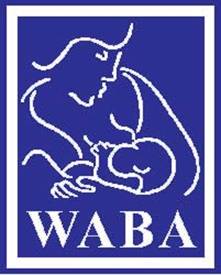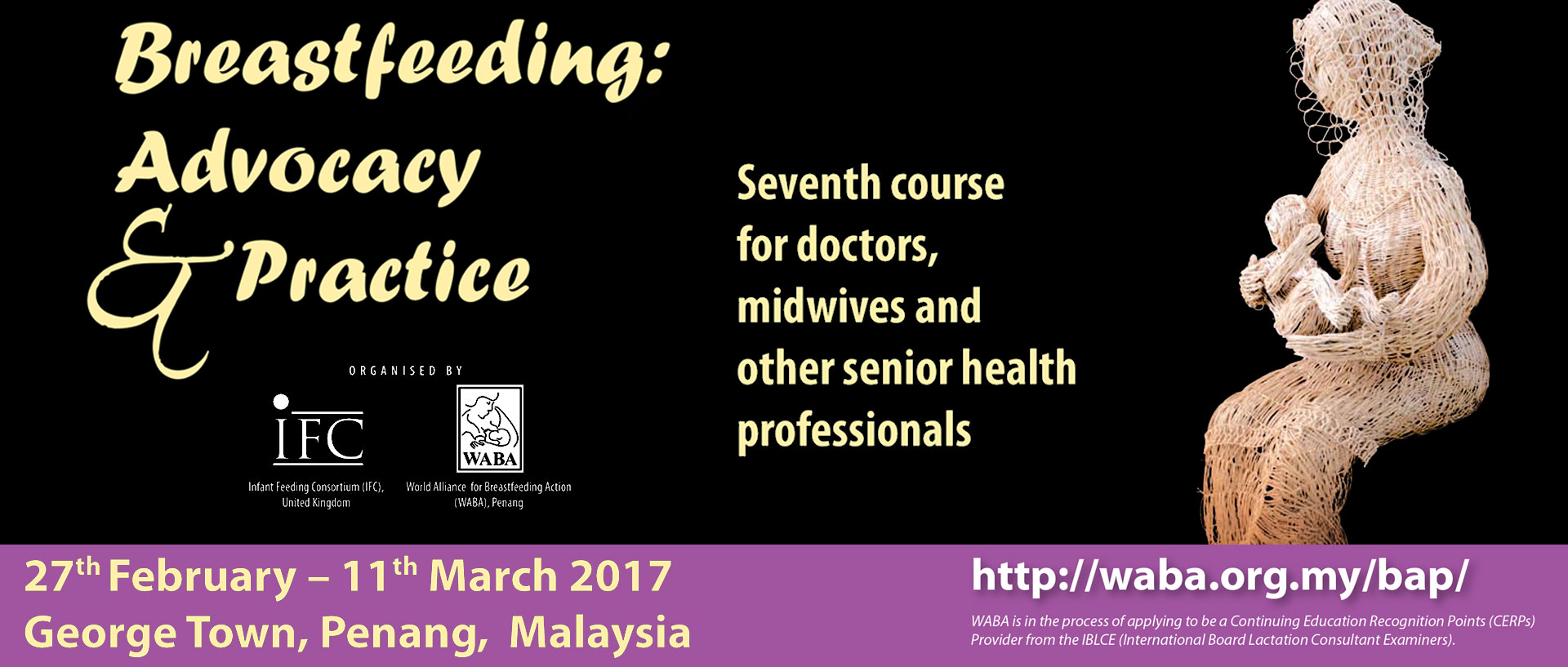WABA’s Education and Training working group is focusing its attention on meeting the need of health care providers to globally understand the basics (both why and how) of lactation and breastfeeding. Our concern is that the curriculum offered to all students of health care science include content which will prepare them both before they begin to serve the public (Pre-service) as well as after they begin to provide health care (In-service) to be able to be supportive of breastfeeding and help mothers succeed.
Health Professionals role in the promotion, protection and support of breastfeeding
Lactation Consultans. These health professionals are identified as International Board Certified Lactation Consultants (IBCLCs). They are the one health professional group whose only focus is on lactation and breastfeeding. Many are also nurses and physicians as well. IBCLCs practice in independent lactation consultancies, physicians’ offices, health clinics, hospitals and other venues where they provide education and direct clinical care to childbearing / breastfeeding families. They work in partnership with other maternal-child health professionals while providing lactation/breastfeeding focused care to mother-baby dyads. Some engage in research regarding lactation/breastfeeding issues. IBCLCs have opportunities to educate other health professionals regarding protection, promotion and support of breastfeeding, as well as advising institutions and governmental and non-governmental organisations regarding policy development as it relates to breastfeeding. They are organised in the International Lactation Consultant Association (ILCA) which is a professional association for lactation consultants world-wide (http://www.ilca.org). ILCA is a Core Partner of the World Alliance for Breastfeeding Action (WABA).
While many stakeholders have banded together to support breastfeeding, the role of the nutritionist in particular is to communicate to the mother and community at large the invaluable health benefits that breastmilk has on a child’s nutritional status, health and survival. Not only is breastfeeding the most sustainable and cost-effective means to feed an infant, it also provides a unique “cocktail” of nutrients and antibodies to promote optimal growth in the infant. Nutritionists can work through hospitals, government agencies and Universities to highlight what exactly makes breastmilk the best choice for infant feeding. Nutritionists work in diverse settings ranging from clinical to public health, research in humanitarian and development assistance and thus have unique opportunities to promote, protect and support breastfeeding. They can work with mothers to create a comprehensible working knowledge of diet diversity. For example, breastmilk provides essential vitamin and minerals along with a sufficient energy requirement that a meal of simple starch cannot provide. The lead UN agency working with nutrition issues globally is UNICEF (http://www.unicef.org/nutrition/index_role.html).
Physicians. Breastfeeding is a normal part of a mother and child’s everyday live and not a medical matter. Doctors are in an ideal position to influence a mother’s decisions about infant feeding because they see them at so many key decision-points in their babies’ live. They can make a difference in increasing breastfeeding initiation rates and especially breastfeeding continuation rates by advocating breastfeeding, supporting breastfeeding mothers and providing appropriate evidence-based care for breastfeeding mothers. Physicians who are confident and capable in breastfeeding management will find many occasions to promote and support breastfeeding. Prenatal intention to breastfeed is influenced to a great extent by health care providers’ opinion and support.
If breast feeding, with all its benefits, is to be established as a majority activity, physicians must learn to recognise the elaborate web woven around them by formula manufacturers. Health professionals are an important target for the baby food industry promotion. If a company succeeds in persuading physician, it can influence the infant feeding choices of many mothers. Current attitudes concerning infant nutrition have been moulded by the manufacturers of human milk substitutes who have aggressively created markets for their products. They have advertised to physicians and directly to the public in ways that are inconsistent with the International Code of Marketing for Human Milk Substitutes. Infant formula companies continue to provide gifts to physicians and offer sponsorship to them and their professional organisations.
Breastfeeding is the best investment with great returns. Knowledgeable health-care providers are the key to promoting and protecting breastfeeding. They can play a pivotal role in helping to increase the prevalence and duration of breastfeeding among mothers. Physicians can empower their knowledge in Breastfeeding information from international organisations like Academy of breastfeeding medicine http://www.bfmed.org/; WellStart international http://www.wellstart.org
Courses
BREASTFEEDING: ADVOCACY AND PRACTICE COURSE
View details of BAP course.
View details on earlier previous BAP course
Revised 3rd Edition of the Wellstart’s Lactation Management Self-Study Modules, Level 1.
This educational tool is now available in English and Spanish, it is downloadable without charge from http://www.wellstart.org/
This tool is intended for use by medical and nursing students as they begin their clinical assignments but can be also be used by anyone who has never been exposed to breastfeeding issues before or those who need a quick review. Wellstart International hopes that this tool will be able to help increase the general knowledge of about lactation and breastfeeding promotion among the world’s health care providers irrespective of areas of specialisation.

